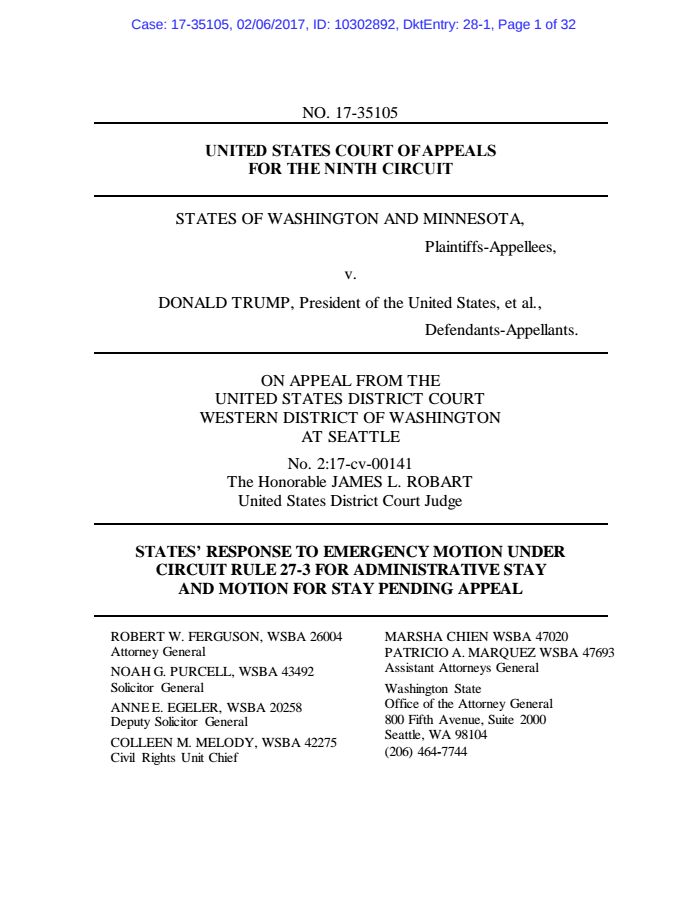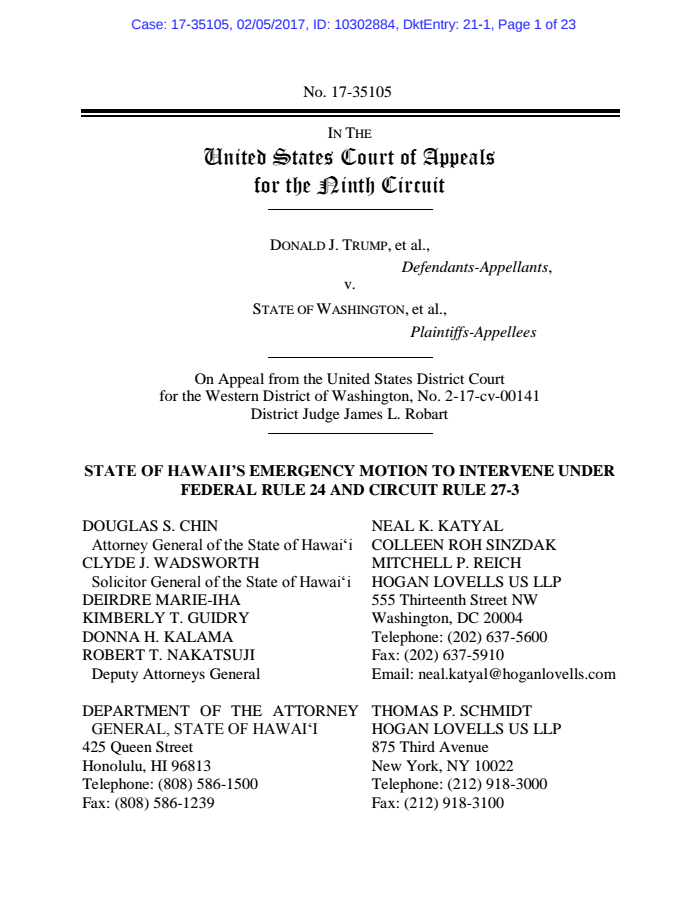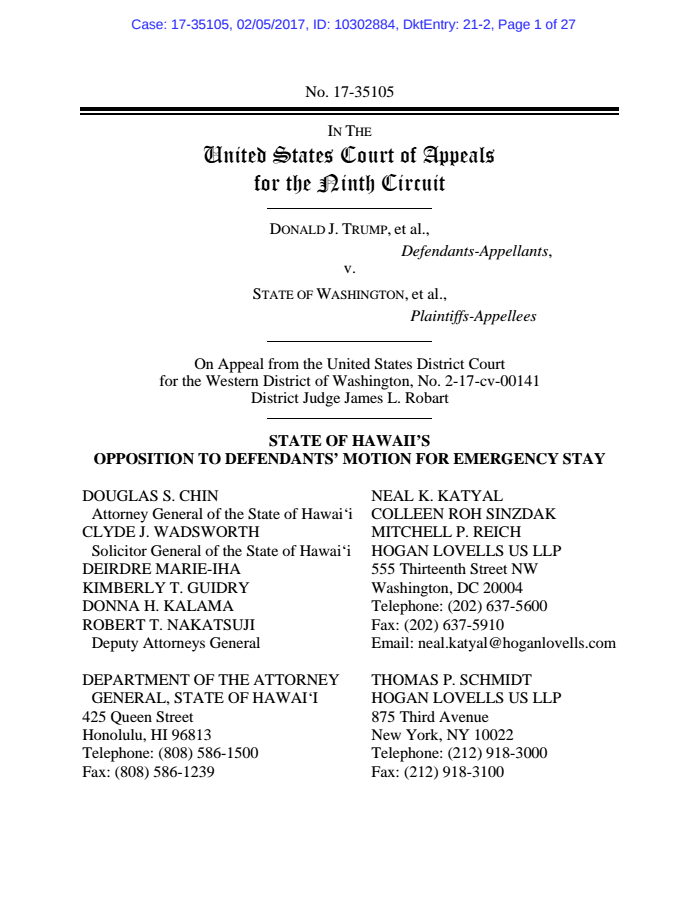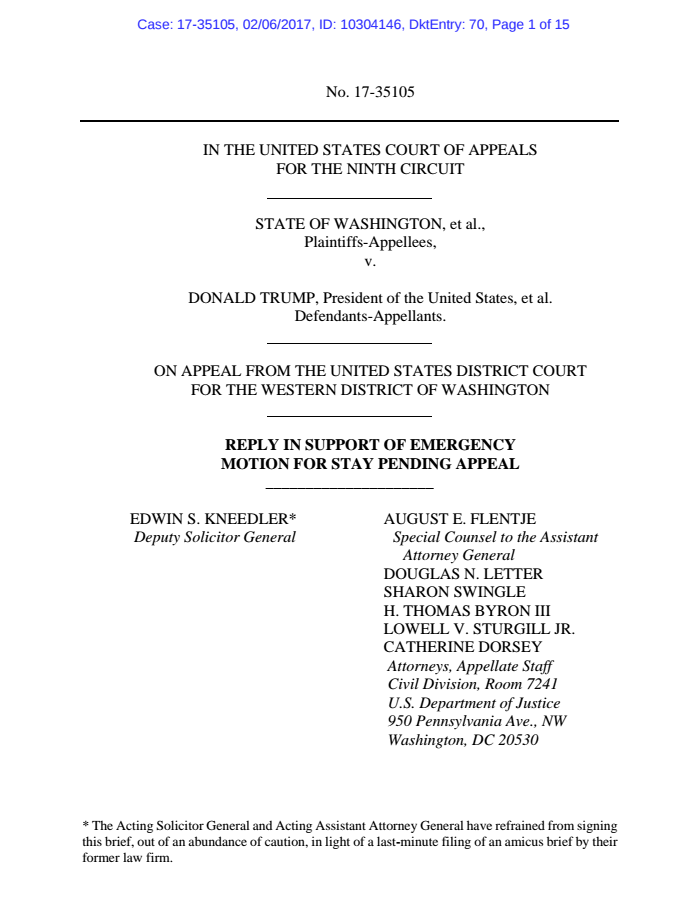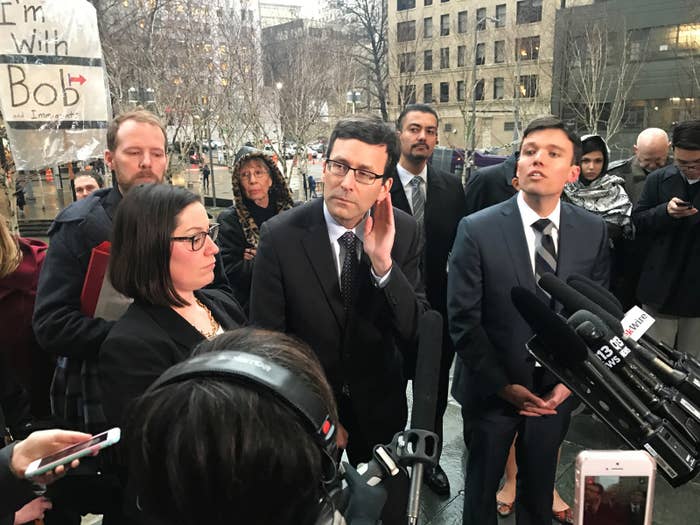
WASHINGTON — In overnight filings, the states of Washington and Minnesota, joined by Hawaii, technology companies, former senior foreign policy officials, civil rights groups, a refugee relief nonprofit, and law professors laid out the legal case against President Trump's refugee and travel ban executive order.
On Monday afternoon, a group of 16 state attorneys general — led by Massachusetts, New York, and Pennsylvania officials — filed a brief in support of the other states' challenge to the ban. Some of this group of states — Massachusetts, New York, and Virginia — already have taken action to intervene in ongoing lawsuits over the ban that started in their own states.
The filings came in opposition to the Justice Department's request that a Feb. 3 district court order halting enforcement of the executive order be stayed — or put on hold — so the government could restart enforcement of the ban while the case is appealed.
Minutes after the Justice Department filed its reply in support of its request, the US Court of Appeals for the Ninth Circuit announced that it would be holding an hour-long argument over the request at 3 p.m. Pacific Time Tuesday. The argument will be held over the phone, per the court's order. "A recording of the oral argument will be made available to the public promptly following the conclusion of oral argument," the court announced.
The court later announced that the arguments will be livestreamed on the court's website.
US District Judge James Robart issued a temporary restraining order (TRO) on Feb. 3, halting enforcement of key provisions of the Jan. 27 executive order: the ban on travel to the US from seven majority-Muslim countries and the halt to the refugee program.
"The effects of the TRO were positive and immediate, as immigration procedures began to return to normal, families reunited, stranded students and faculty began returning to our States, and longtime State residents were able to return to their homes," Washington and Minnesota lawyers wrote. "Defendants now ask this Court to unleash chaos again by staying the district court order. The Court should decline."
The US Court of Appeals for the 9th Circuit denied the Justice Department's request for an immediate stay of Robart's order on Feb. 4, but set a briefing schedule for the request for a stay pending appeal. Opponents of the executive order had filings due by 1 a.m. Pacific Time Monday, while the Justice Department's reply is due by 3 p.m. Pacific Time Monday.
The Justice Department had argued in its Feb. 4 filing that the TRO, which is not generally appealable, should be treated as a preliminary injunction, which can be appealed, because there was an adversarial hearing — as in, both sides were at court and presented arguments — and the length of the injunction here is "indefinite."
"Not so," Washington and Minnesota lawyers replied on Monday, noting that "the TRO expressly ends when 'the court can hear and decide the States’ request for a preliminary injunction.'" The states note that under their proposed schedule at the district court, a hearing on a preliminary injunction could happen within 15 days. "The Court should wait to review an order at that time, not prematurely take up this one," they argue.
A key jurisdictional question put forth by the Justice Department is one of standing, whether the states have a "concrete and particularized injury" that results from the executive order. The federal lawyers argue that the states are not subject to the order, and that, even if the states could show that they have standing to bring the lawsuit, the broad injunction goes beyond the states' particular claims.
The states counter that they have provided both evidence of direct harms — in particular to state universities and to tax revenues — and indirect harms "that the Order is inflicting grievous harms on our residents."
Beyond those two questions of whether the case and appeal are properly before the court is the main underlying question at the injunction stage: Is the Justice Department likely to succeed on the merits of its defense of the executive order?
The Justice Department, unsurprisingly, says it is, because the president has constitutional authority over "conduct of foreign relations [and] the war power" and statutory authority "to prevent the entry of any alien or groups of aliens into this country."
The states, also unsurprisingly, say it is not, because the executive order violates the Immigration and Nationality Act's nondiscrimination provision, as well as constitutional due process, equal protection, and Establishment Clause claims.
The Justice Department filed its reply brief supporting its request for a stay a little before the 3 p.m. Pacific Time deadline.
The American Center for Law and Justice weighed in to support the administration, as did Freedom Watch. A group of several conservative organizations, led by the US Justice Foundation and Citizens United, also filed a brief in support of the administration.
Hawaii, which filed its own lawsuit challenging the executive order, asked to intervene in the Washington and Minnesota lawsuit. "Hawaii’s intervention in this appeal is necessary to protect its interests, because this Court’s decision could create binding circuit precedent that affects Hawaii’s case," the lawyers for the state — including former Acting Solicitor General Neal Katyal, now at Hogan Lovells — argue in the filing asking to intervene.
The Ninth Circuit did not set a time for when it will issue a decision on whether to grant the stay (or grant Hawaii's intervention request).
This is a developing story. Please check back at BuzzFeed News for more.
Read the filing from HIAS, Inc., a nonprofit refugee protection organization.
assets.documentcloud.org

